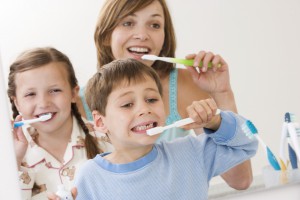Children’s Dentistry
It is our aim to provide excellent dental treatment for children in a relaxed and caring environment, so that they are happy to visit the dentist. We feel that it is important to ensure that children grow up with a positive attitude towards dental health.
We would like to see patients from as young as one year old. This enables us to check for early signs of any problems and to advise on dental health and diet and to help establish good preventive habits from an early age. We emphasise the importance of dental health to children as they get older and how to take more responsibility for their own dental care.
Childhood has been identified as the most important period in a person’s dental treatment. We believe that developing good habits at an early age and scheduling regular dental visits helps children get a good start on a lifetime of healthy teeth and gums.
if you child plays contact sports it is important to protect their teeth from damage, custom made sports mouthguards, which are both colourful and comfortable can be made on request.
We treat the majority of children on the NHS.
 Advice to Young Patients
Advice to Young Patients
Children aged up to 3 years
- Breast feeding provides the best nutrition for babies
- From 6 months of age infants should be introduced to drinking from a cup, and from age one year feeding from a bottle should be discouraged
- Sugar should not be added to weaning foods
- Parents should brush or supervise toothbrushing
- Use only a smear of toothpaste containing no less than 1000ppm fluoride
- As soon as the teeth erupt in the mouth brush them twice daily
- Brush last thing at night and on one other occasion
- The frequency and amount of sugary foods and drinks should be reduced Sugar free medicines should be recommended
Children aged 3 -6 years
- Brush at least twice daily with a fluoridated toothpaste.
- Brush last thing at night and at least on one other occasion
- Brushing should be supervised by an adult
- Use a pea-sized amount of toothpaste containing more than 1000 ppm fluoride
- Spit out after brushing and do not rinse
- The frequency and amount of sugary foods and drinks should be reduced Sugar free medicines should be recommended
Plus: Dentists should apply fluoride varnish to teeth twice yearly
Children aged from 7 years
- Brush twice daily with a fluoridated toothpaste
- Brush last thing at night and on one other occasion
- Use fluoridated toothpaste (1350ppm – 1500 ppm fluoride)
- Spit out after brushing and do not rinse
- The frequency and amount of sugary foods and drinks should be reduced.
Plus: Dentists should apply fluoride varnish to teeth twice yearly
If your child is at a higher risk of dental caries, or is giving concern, additional measures are advised and these will be discussed with you by your dentist.
Evidence-based advice about healthier eating
- The frequency and amount of consumption of sugars should be reduced
- Avoid sugar containing foods and drinks at bedtime when saliva flow is reduced and buffering capacity is low
- Amount and frequency of consumption of sugars should be reduced
- Avoid sugar containing drinks at bedtime
- Added sugars should provide less than
- 10% of total energy in the diet OR 60g per person per day
- (for young children 30g per day – one teaspoon is c 5-6g)
- Eating the right amount of food relative to how active a person is to be a healthy weight
- Eating a range of foods in line with the ‘eatwell plate’.
– Plenty of fruit and vegetables 5< portions a day – variety for different fibres, vitamins, nutrients
– Plenty of starchy foods (bread, pasta, rice, potatoes) – base meal on starchy foods
– Some milk and dairy foods
– Some meat, fish, eggs, beans and other non-dairy sources of protein. (eat more fish, especially oily fish)
– Foods and drinks high in fat, sugar, or salt – consume infrequently in small amounts
– Saturated v unsaturated fats, no more than 6g salt/day,
– Drink 6-8 glasses water/day (1.2 lts)
Principles of toothbrushing for oral health
- Start as soon as first primary tooth erupts
- Twice daily as a minimum, last thing at night before bed + 1
- Children under 3 – no less than 1000 ppm Fl-
- Children under 3 – only a smear, must not eat or lick toothpaste from tube
- Family toothpaste (1,350-1,500 ppm Fl-) for all other children
- Children 3-6 – a pea size amount of toothpaste
- Children need to be helped/supervised up to 7 years old
- Rinsing after toothbrushing (water, mouthwashes or mouthrinses –even fluoride ones) reduces effect of toothpaste – should be discouraged
- Patient’s own method of toothbrushing may be modified to maximise plaque removal, systematically cleaning all tooth surfaces
- No method/technique is better than another
- Disclosing tablets help to indicate cleanliness
- Brushing is more effective with small headed toothbrush, medium texture bristles (ISO 20126 (2012))

 Advice to Young Patients
Advice to Young Patients





